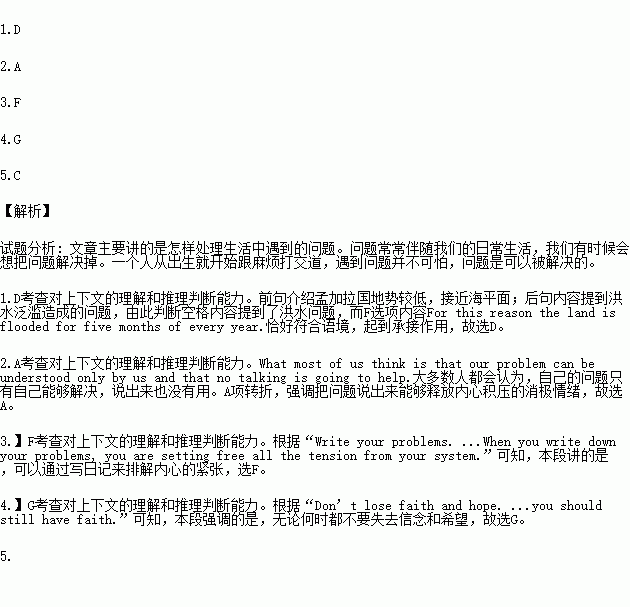题目内容
根据短文内容,从短文后的选项中选出能填入空白处的最佳选项。选项中有两项为多余选项。
Although problems are a part of our lives, it certainly doesn’t mean that we let them rule our lives forever. One day or the other, you’ll have to stand up and say—problem, I don’t want you in my life.
__1..Problems with friends, parents, girlfriends, husbands, and children—the list goes on. Apart from these, the inner conflicts within ourselves work, too. These keep adding to our problems. Problems come in
different shapes, colors and feelings.
But good news is that all problems can be dealt with. Now read on how to solve your problems.
Talk about your problems. What most of us think is that our problem can be understood only by us and that
no talking is going to help. __2.__ Talking helps you move on and let go.
Write your problems. __3.__ When you write down your problems, you are setting free all the tension from your system. You can try throwing away the paper on which you wrote your problems. By doing this, imagine yourself throwing away the problems from your life.
Don't lose faith and hope. No matter what you lose in life, don’t lose faith and hope. Even if you lose all your
money, family…you should still have faith. __4.
Your problems aren’t the worst. No matter what problem you get in life, there’re another one million people whose problems are huger than yours. _5._ Your problems might just seem big and worse, but in reality they can be removed.
Go about and solve your problems because every problem,however big or small,always has away out.
A. But the truth is that when you talk about it, you’re setting free the negative energies that have been gathering within you.
B. When we have a pressing, critical, urgent, and life-threatening problem, how do we try to solve it.
C. Tell yourself: when they can deal with them, why can't I?
D. Of course, we’ve been fighting troubles ever since we were born.
E. We can often overcome the problem and achieve the goal by making a direct attack.
F. Having a personal diary can also be of huge help if you don't want a real person to talk with.
G. With faith and hope, you can rebuild everything that you lose.
 天天向上一本好卷系列答案
天天向上一本好卷系列答案 小学生10分钟应用题系列答案
小学生10分钟应用题系列答案

 tting over the phone.
tting over the phone. rance
rance